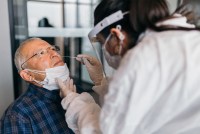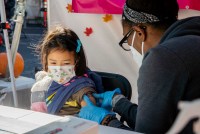Latest Morning Briefing Stories
This Doctor Thought She Could Navigate US Health Care. Then Her Autistic Son Needed Help.
Dr. Mai Pham left her corporate career to spark change in a system that is failing millions of Americans with autism and other intellectual and developmental disabilities.
‘American Diagnosis’ Episode 3: Uranium Mining Left Navajo Land and People in Need of Healing
Episode 3 is an exploration of the forces that brought uranium mining to the Navajo Nation, the harmful consequences, and the fight for compensation that continues today.
KHN’s ‘What the Health?’: FDA Takes Center Stage
Congress is set to start its once-every-five-years review of the law that authorizes user fees to finance the hiring of personnel to speed the FDA review of drugs. The periodic renewals of “PDUFA” also give lawmakers a chance to make other changes to the agency at the hub of the pandemic. Meanwhile, the FDA could also find itself at the center of the abortion debate and a controversial new medication to treat Alzheimer’s disease. Anna Edney of Bloomberg News, Joanne Kenen of the Johns Hopkins Bloomberg School of Public Health and Politico, and Sarah Karlin-Smith of the Pink Sheet join KHN’s Julie Rovner to discuss these issues and more.
The Doctor Will See You Now — In the Hallway
At Salem Health Salem Hospital in Oregon, the omicron surge is still swamping health care workers. They are ground down emotionally but keep showing up for their patients.
KHN’s ‘What the Health?’: Paging the HHS Secretary
Health and Human Services Secretary Xavier Becerra is drawing criticism for his hands-off handling of the covid crisis even though the heads of the Centers for Disease Control and Prevention, National Institutes of Health, and FDA report to him. Meanwhile, the Department of Labor looks to enforce mental health “parity laws” that have failed to achieve their goals. Margot Sanger-Katz of The New York Times, Alice Miranda Ollstein of Politico, and Rachel Cohrs of Stat join KHN’s Julie Rovner to discuss these issues and more. Also this week, Rovner interviews KHN’s Noam N. Levey, who reported and wrote the latest KHN-NPR “Bill of the Month” episode about a large emergency room bill for a small amount of medical care.
At Nursing Homes, Long Waits for Results Render Covid Tests ‘Useless’
As omicron surges, more nursing homes are facing a double whammy: Lab tests are taking too long, and fast antigen tests are in short supply.
‘An Arm and a Leg’: Know Your ‘No Surprises’ Rights
The No Surprises Act protects patients from surprise out-of-network bills. But there are caveats. For instance, these protections apply only to care in a hospital. This episode breaks it all down.
The Advice to Vaccinate and Test Isn’t Much Help to Parents With Kids Under 5
Many parents of children too young for vaccines are exhausted. Some feel isolated and even forgotten by those who just want to move on even as omicron continues to sweep through parts of the country.
‘American Diagnosis’ Episode 2: Reclaiming Native Food Traditions to Nourish Indigenous People
Native foodways of hunting, fishing, gathering, and farming have been under threat since the arrival of Europeans. In this episode, hear how Indigenous people are reclaiming their food traditions to improve community health.
Listen: Generous Deals, and a Few Unwanted Surprises, at Covered California
Southern California correspondent Bernard J. Wolfson answers questions about the health coverage deals available on California’s Affordable Care Act marketplace during Radio Bilingüe’s news program “Línea Abierta.”
KHN’s ‘What the Health?’: Record ACA Enrollment Puts Pressure on Congress
Temporary subsidies helped boost enrollment under the Affordable Care Act to a record 14.5 million, according to the Department of Health and Human Services. But unless Democrats in Congress extend those subsidies, many of those new enrollees will be in for a rude surprise just ahead of midterm elections. Meanwhile, the need to replace retiring Supreme Court Justice Stephen Breyer further crowds an already tight legislative schedule. Joanne Kenen of Politico and the Johns Hopkins Bloomberg School of Public Health, Sarah Karlin-Smith of the Pink Sheet, and Anna Edney of Bloomberg News join KHN’s Julie Rovner to discuss these issues and more. Also this week, Rovner interviews Diana Greene Foster, author of “The Turnaway Study: Ten Years, a Thousand Women, and the Consequences of Having — Or Being Denied — An Abortion.”
With a Vaccine Mandate Looming, Nursing Homes Face More Staffing Problems
Missouri has the worst covid-19 vaccination rate for nursing home health care workers in the nation. There, the federal mandate for workers to get vaccinated — upheld by the U.S. Supreme Court — reveals the problems that operators have hiring staff, keeping them, and providing decent care.
The Doctor Didn’t Show Up, but the Hospital ER Still Charged $1,012
A St. Louis-area toddler burned his hand on the stove, and his mom took him to the ER on the advice of her pediatrician. He wasn’t seen by a doctor, and the dressing on the wound wasn’t changed. The bill was more than a thousand dollars.
KHN’s ‘What the Health?’: Roe v. Wade’s (Possibly Last) Anniversary
Jan. 22 marks the 49th — and very likely last — anniversary of the Supreme Court’s landmark abortion decision, Roe v. Wade. The court’s conservative supermajority seems poised to overturn later this year the ruling that legalized abortion nationwide. Also this week, the Biden administration turns 1, with much of its domestic and health agenda yet unrealized. Alice Miranda Ollstein of Politico, Shefali Luthra of the 19th, and Kimberly Leonard of Insider join KHN’s Julie Rovner to discuss these issues and more. Also this week, Rovner interviews Marjorie Dannenfelser, president of the Susan B. Anthony List, about what a post-Roe world might look like.
‘American Diagnosis’ Episode 1: On the Navajo Nation, Root Causes Complicated the Covid Fight
Explore what made the Navajo people ― also known as the Diné ― so vulnerable to the first surges of the covid-19 pandemic. The first episode of “Rezilience,” Season 4 of the “American Diagnosis” podcast, begins in the forests outside the Grand Canyon.
As Omicron Surges, Effort to Vaccinate Young Children Stalls
Just 18% of 5- to 11-year-olds are fully vaccinated, with rates varying significantly across the country, a KHN analysis of federal data shows. Pediatricians say the slow pace and geographic disparities are alarming, especially against the backdrop of record numbers of cases and pediatric hospitalizations.
KHN’s ‘What the Health?’: Dealing With Drug Prices
Medicare officials tentatively plan to restrict the use of a controversial Alzheimer’s drug to only those patients participating in clinical trials, while the Department of Health and Human Services looks into lowering the monthly Medicare Part B premium. Meanwhile, covid confusion still reigns, as the Biden administration moves, belatedly, to make more masks and tests available. Joanne Kenen of Politico and the Johns Hopkins Bloomberg School of Public Health, Sarah Karlin-Smith of the Pink Sheet and Rachel Cohrs of Stat join KHN’s Julie Rovner to discuss these issues and more.
Watch and Listen: Examining the Risks of Covid’s Spread Within Hospitals
KHN Midwest correspondent Lauren Weber talks about the risks of covid’s spread in hospitals on the “1A” radio program and on the Newsy TV network.
KHN’s ‘What the Health?’: Contagion Confusion
It’s 2022 and the covid-19 pandemic is still with us, as are congressional efforts to pass President Joe Biden’s big health and social spending bill. But other issues seem certain to take center stage on this year’s health agenda, including abortion, the state of the health care workforce, and prescription drug prices. Tami Luhby of CNN, Alice Miranda Ollstein of Politico and Mary Ellen McIntire of CQ Roll Call join KHN’s Julie Rovner to discuss these issues and more. Also this week, Rovner interviews KHN’s Victoria Knight, who reported the latest KHN-NPR “Bill of the Month” episode.
The War on Cancer at 50: The Origin Story Begins With a Socialite Citizen-Lobbyist
After the National Cancer Act became law 50 years ago, cancer went from shameful taboo to one of the best-funded areas of medicine. Much of the credit for this transformation goes to one woman, Mary Lasker.






















